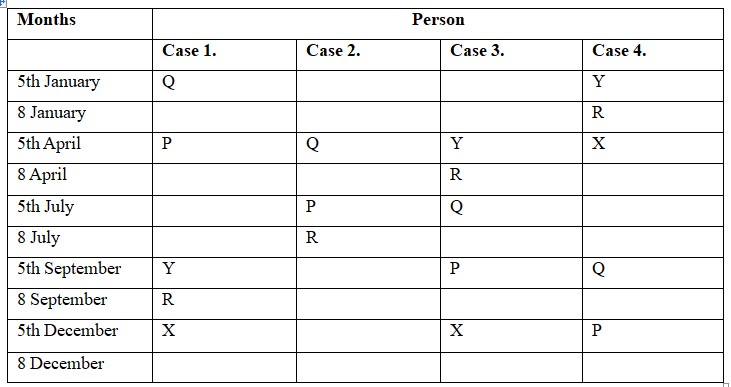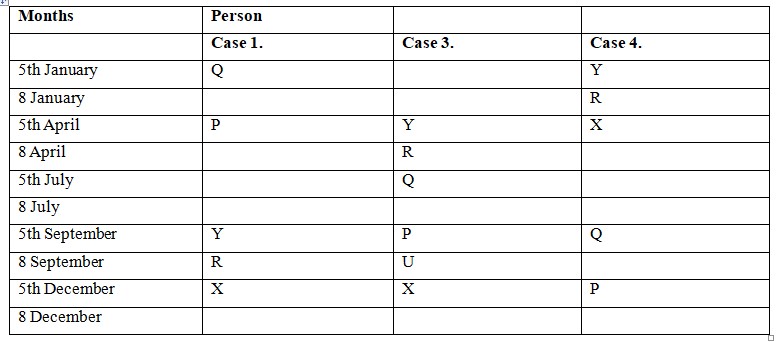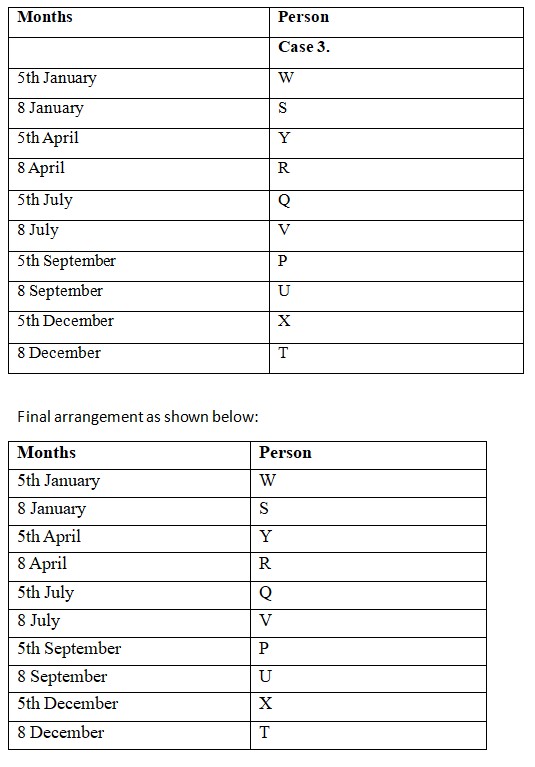Question
Who among the following person attends the seminar just
after V? Study the following information carefully and answer the below questions. Ten persons namely –P, Q, R, S, T, U, V, W, X, and Y attend a seminar event in five different months viz.- January, April, July, September, December. Seminar in each month was scheduled on the 5thrd and 8th of the month. All the information is not necessary in the same order. The number of persons is attending a seminar after P is the same as the number of persons is attending the seminar before R. P attends seminar two months after Q, who attends the seminar on an odd date. R and Y attend the seminar in the same month. The number of persons is attending the seminar between Y and Q is the same as the number of persons is attending the seminar between P and X. The number of persons attending the seminar between U and R is one less than the number of persons is attending the seminar between W and V. U attends seminar three months before X, who attends seminar in one of the months has 31 days. V attends seminar on the 8th of the month but not in January. W and S attend seminars in the same month. At least two persons attend the seminar between T and P.Solution
The number of persons is attending a seminar after P is the same as the number of persons is attending the seminar before R. P attends seminar two months after Q, who attends the seminar on an odd date. R and Y attend the seminar in the same month. We will have four cases: If Q attends seminar on 5th January, then P will attend on 5th April. R will attend on 8 September and Y will attend on 5th September. If Q attends seminar on 5th April, then P will attend on 5th July. R will attend on 8 July but we do not have dates for Y. If Q attends seminar on 5th July, then P will attend on 5th September. R will attend on 8 April and Y will attend on 5th April. If Q attends seminar on 5th September, then P will attend on 5th December. R will attend on 8 January and Y will attend on 5th January.  The number of persons is attending the seminar between Y and Q is the same as the number of persons is attending the seminar between P and X. In case 1, there are five person between Q and Y. So, X attends seminar on 5th December. In case 3, there is one person between Q and Y. So, X attends seminar on 5th December. In case 4, there are five person between Q and Y. So, X attends seminar on 5th April. U attends seminar three months before X, who attends seminar in one of the months has 31 days. Case 1 and 4 will get discarded as we know that X attends the seminar in December and U should have attended in September. In case 3, U attends seminar on 8 September
The number of persons is attending the seminar between Y and Q is the same as the number of persons is attending the seminar between P and X. In case 1, there are five person between Q and Y. So, X attends seminar on 5th December. In case 3, there is one person between Q and Y. So, X attends seminar on 5th December. In case 4, there are five person between Q and Y. So, X attends seminar on 5th April. U attends seminar three months before X, who attends seminar in one of the months has 31 days. Case 1 and 4 will get discarded as we know that X attends the seminar in December and U should have attended in September. In case 3, U attends seminar on 8 September  At least two persons attend the seminar between T and P. So, T attends seminar on 8 December. V attends seminar on the 8th of the month but not in January. Now it is clear that V attends the seminar on 8 July. The number of persons attending the seminar between U and R is one less than the number of persons is attending the seminar between W and V . W and S attend seminars in the same month. We know that three person are there between U and R. It means that there would have been four person between V and W. So, W and S attend seminar on 5th January and 8 January respectively.
At least two persons attend the seminar between T and P. So, T attends seminar on 8 December. V attends seminar on the 8th of the month but not in January. Now it is clear that V attends the seminar on 8 July. The number of persons attending the seminar between U and R is one less than the number of persons is attending the seminar between W and V . W and S attend seminars in the same month. We know that three person are there between U and R. It means that there would have been four person between V and W. So, W and S attend seminar on 5th January and 8 January respectively.  Practice Next
Practice Next
- The present ages of Arun and Varun are in the ratio 1:2. 5 years ago, the average age of Arun, Varun, and Kiran was 25 years. At that time, Arun was 10 yea...
Twelve years ago, the average age of a family having four members (father, mother, son and daughter) is (y-2) years. The ratio between the present ages ...
Five years ago, the ratio of Aman's age to Rahul's age was 6:5. It is also known that Aman's age will be 47 years five years from now. Additionally, R...
The total age of A, B and C six years hence will be 89 years. Find the age of C five years hence, if the present age of A and B is 33 years and 24 years...
The Average age of 25 pupils in a class is ‘y’ years. If their principal, aged 50 years, joins them, the average rises by 1 year. Find the value of ...
Currently, the average age of individuals 'A' and 'B' is 27 years. If the present ages of 'B' and 'C' maintain a ratio of 10:11, determine the age of 'C...
- The present age ratio of Rohit to Ramesh is 6:5. If Rohit's age 3 years ago was the same as Ramesh's age 4 years from now, then find the present age of Roh...
The average age of A, B and C is 40 years, while the average age of B, A and D is 30 years. If the ratio of the age of C and D is 5:3, respectively, the...
Present age of ‘A’ is 40% more than that of ‘B’. If 10 years hence from now, ‘B’ will be 4 years younger than ‘A’, then find the sum of ...
- The age of Kiran 4 years ago was 10% more than the present age of Deepa. 4 years hence, the ratio of their ages will be 5:4. Find the difference between th...
Relevant for Exams:


